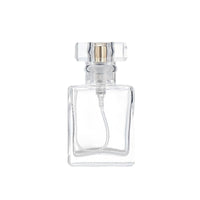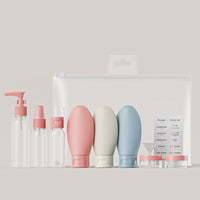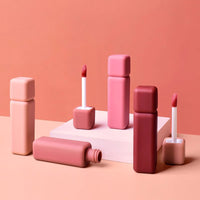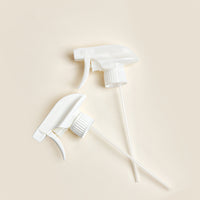Search
-
-
Types of Cosmetic...
Oct 16, 2024 -
Tailored Cosmetic...
Sep 26, 2024
Archive
- October 2024
- September 2024
-
- Tailored Cosmetic Packaging: Enhance Your Product Aesthetics
- Securing Your Pump Bottle: A Guide to Enhancing Safety with Our Innovative Packaging Techniques.
- Everything You Should Be Aware Of Regarding Top-Notch Travel bottles
- Airless Pumps: Understanding Their Functionality and the Perks They Provide
- Sustainable Lotion Bottles: What Sets Them Apart?
- Key Steps for Opening Airless Pump Bottles
- August 2024
Menu

How to Select Suitable Materials for Cosmetic Packaging
6 Considerations for Selecting Cosmetic Packaging Materials
Be sure to consider the following factors when choosing packaging for cosmetic products to ensure product quality, sustainability, and customer satisfaction.
Product Compatibility
Choosing the right material is essential for maintaining the longevity and effectiveness of cosmetics. Inappropriate materials can lead to unwanted chemical reactions or change the product's texture, negatively affecting the user experience. When selecting packaging materials, consider the product’s formulation, consistency, and how well it works with the container’s sealing mechanism. Common materials for cosmetic packaging include plastic, glass, and aluminum.
Product Protection
The primary function of packaging is to protect the cosmetic product from external elements like air, moisture, light, and temperature that could compromise its quality. Assess the material’s ability to endure factors such as temperature fluctuations, humidity, and light exposure. Additionally, consider its strength and durability to prevent leaks and breakage. The packaging should be impermeable to external elements to maintain the product’s integrity and prevent deterioration during transportation or storage.
Sustainability
When choosing packaging materials for cosmetics, consider options that are recyclable, biodegradable, or derived from renewable resources. Sustainable packaging can enhance your business reputation and attract environmentally conscious consumers. Additionally, select suppliers that emphasize sustainable, lean manufacturing practices and use eco-friendly raw materials.
Brand Image
Packaging plays a vital role in conveying a brand’s image and identity. The packaging material should reflect the brand’s aesthetics, values, and identity while appealing to the preferences of the target audience. Consider how various materials, colors, textures, and designs can enhance brand perception and create a cohesive experience across different products.
Convenience for Customers
User experience is crucial when selecting packaging materials. The packaging should facilitate ease of use, portability, and functional dispensing for consumers. Assess how the material’s weight, shape, and design contribute to a convenient and enjoyable experience, ultimately fostering brand loyalty and repeat purchases.
Cost
Evaluate the manufacturing, shipping, and storage costs of the material and how they affect the product’s overall price. Choose cost-effective solutions that align with your brand’s values without sacrificing quality, aesthetics, or sustainability. However, ensure that you don’t compromise on packaging quality to cut costs.
Characteristics of Plastic Packaging for Cosmetic Products
Advantages
Plastic cosmetic packaging offers numerous benefits, such as lightweight construction, shatterproof properties, and cost-effectiveness. These features make it a practical choice for various cosmetic products, including liquids, creams, and gels.
Its lightweight nature makes it ideal for travel-sized packaging, which is particularly important in the cosmetics industry, where such products are popular among consumers. Additionally, plastic packaging’s shatterproof quality ensures that products remain safe during transportation, especially for liquid cosmetics that could spill and create a mess if not properly protected.
Limitations
Although plastic is a widely used option, its non-biodegradable nature contributes to environmental waste and pollution, posing a significant challenge for companies aiming to reduce their ecological footprint. Additionally, plastic packaging is generally less robust compared to other materials, making it unsuitable for certain cosmetic products. Some plastic bottles may also lack durability, compromising product protection and user experience. Brands should carefully consider the pros and cons of plastic packaging and explore eco-friendly alternatives when feasible.
Common Applications
Plastic packaging can be molded into various shapes and sizes, making it ideal for products such as lotions, serums, and toners, as well as thicker items like creams and masks. Its flexibility and resilience also make it suitable for gel-like products, allowing it to withstand pressure without breaking or cracking, ensuring safe and functional packaging.
Characteristics of Aluminum Packaging for Cosmetics
Aluminum is a lightweight, durable, and recyclable material frequently utilized in cosmetic packaging. Below, you'll find its properties, benefits, limitations, and common applications.
Benefits
Aluminum is a popular choice for cosmetic packaging due to its many advantages. One of the primary benefits is its lightweight nature, which makes it easy to handle and transport.
Additionally, aluminum offers excellent resistance to air, light, and moisture, ensuring that the cosmetics inside remain well protected. This is particularly important for products sensitive to external factors like oxygen and sunlight. Its recyclable nature also makes aluminum a more environmentally friendly option compared to non-biodegradable materials.
Furthermore, with its sleek and modern appearance, aluminum packaging can enhance a brand’s visual appeal and perceived value. In summary, aluminum packaging provides numerous benefits, including lightweight construction, resistance to air, moisture, and light, durability, and eco-friendliness.
Limitations
Despite its many benefits, aluminum packaging has some limitations for cosmetic use. One significant drawback is that aluminum packaging is generally more expensive than plastic alternatives, which can be a major concern for businesses with budget constraints.
Additionally, while aluminum is recyclable, it is not biodegradable, which may be a drawback for eco-conscious consumers. Brands should carefully consider the advantages and disadvantages of aluminum packaging to determine its suitability for their specific products and target audience.
Common Applications
In the cosmetic industry, aluminum packaging has a wide range of applications. It is frequently used for aerosol cans, including those for deodorants, hairsprays, and mousse products, thanks to aluminum's lightweight properties.
Moreover, the durability and barrier qualities of aluminum make it an excellent choice for thick products such as creams, balms, and ointments, providing robust protection against environmental factors while delivering a premium, high-end aesthetic.
Characteristics of Glass Packaging for Cosmetics
Benefits
Glass packaging offers several advantages, primarily its chemical inertness, which ensures product compatibility and preserves the integrity of cosmetic formulations. This makes it ideal for packaging skincare products and other cosmetics containing sensitive ingredients, as the glass's chemical stability helps maintain the product's safety and efficacy throughout its shelf life.
Additionally, the premium appearance of glass packaging provides a luxurious feel, appealing to consumers looking for upscale products. Suppliers can also customize glass containers for cosmetic packaging. Furthermore, glass is recyclable, making it a more sustainable choice compared to non-biodegradable materials, and it is non-toxic, meaning it won’t release harmful chemicals during the recycling process.
Limitations
Despite its numerous benefits, glass packaging is generally heavier than alternatives like plastic and aluminum, making it less ideal for shipping and transportation of cosmetic products. Additionally, glass is fragile and can break easily if not handled carefully, raising safety concerns.
Furthermore, glass packaging is typically more expensive to produce, transport, and store, which may deter some businesses from choosing it. Brands should thoughtfully weigh the trade-offs associated with glass packaging before making a decision.
Common Applications
Glass packaging is particularly well-suited for thicker products such as creams, serums, and balms, as well as high-end cosmetics that benefit from an upscale appearance. Its chemical inertness and barrier properties make it an excellent choice for preserving product quality, ensuring that the formulations remain effective throughout their shelf life.
Sun Nature: Delivering High-Quality Packaging for Cosmetic Products
Sun nature is a reliable supplier of cosmetic packaging, offering a diverse range of materials, including plastic, aluminum, and glass. With a commitment to sustainability, we provide environmentally friendly options, including recycled packaging made from eco-conscious raw materials.
In addition to high-quality packaging solutions, Sun nature offers comprehensive design services to help brands create visually appealing and functional packaging that reflects their unique identity and values. We also provide OEM solutions with low minimum order quantities (MOQ), making it easier for brands to bring their vision to life.
At Sun nature, we operate over 30 sets of injection molding machines to create custom packaging solutions. We ensure the production of high-end packaging with approximately a 98% quality rate. Our first-class standard workshop adheres to sustainability and lean manufacturing practices.
Conclusion
Selecting the right cosmetic packaging materials is crucial for ensuring product compatibility, protection, and brand appeal. By understanding the properties of popular materials such as plastic, aluminum, and glass, and considering factors like sustainability, cost, and consumer convenience, you can make informed choices for your packaging needs.
Sun Nature is your trusted partner for high-quality cosmetic packaging materials and design services. Contact Sun Nature today for a personalized quote and elevate your brand with the ideal packaging solution.
Contact us
Add: No. 8 Building, Xinchengda Industrial Park, Wuhuan Road, Dongxihu, Wuhan 430040, China
(+86)18963979371
(+86)027-83372627
info@snpacks.com









